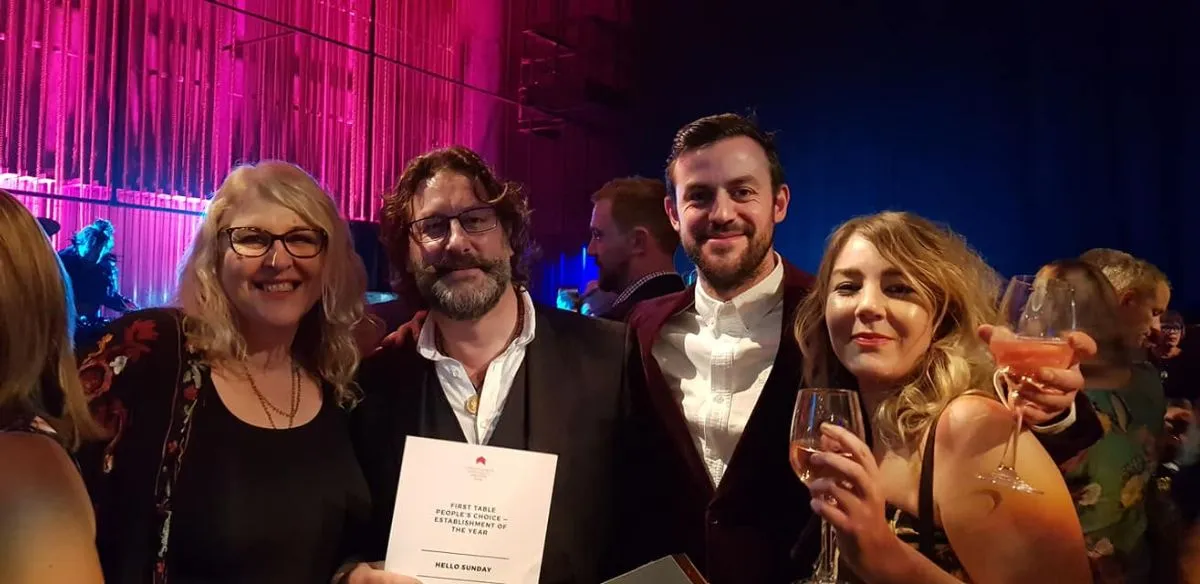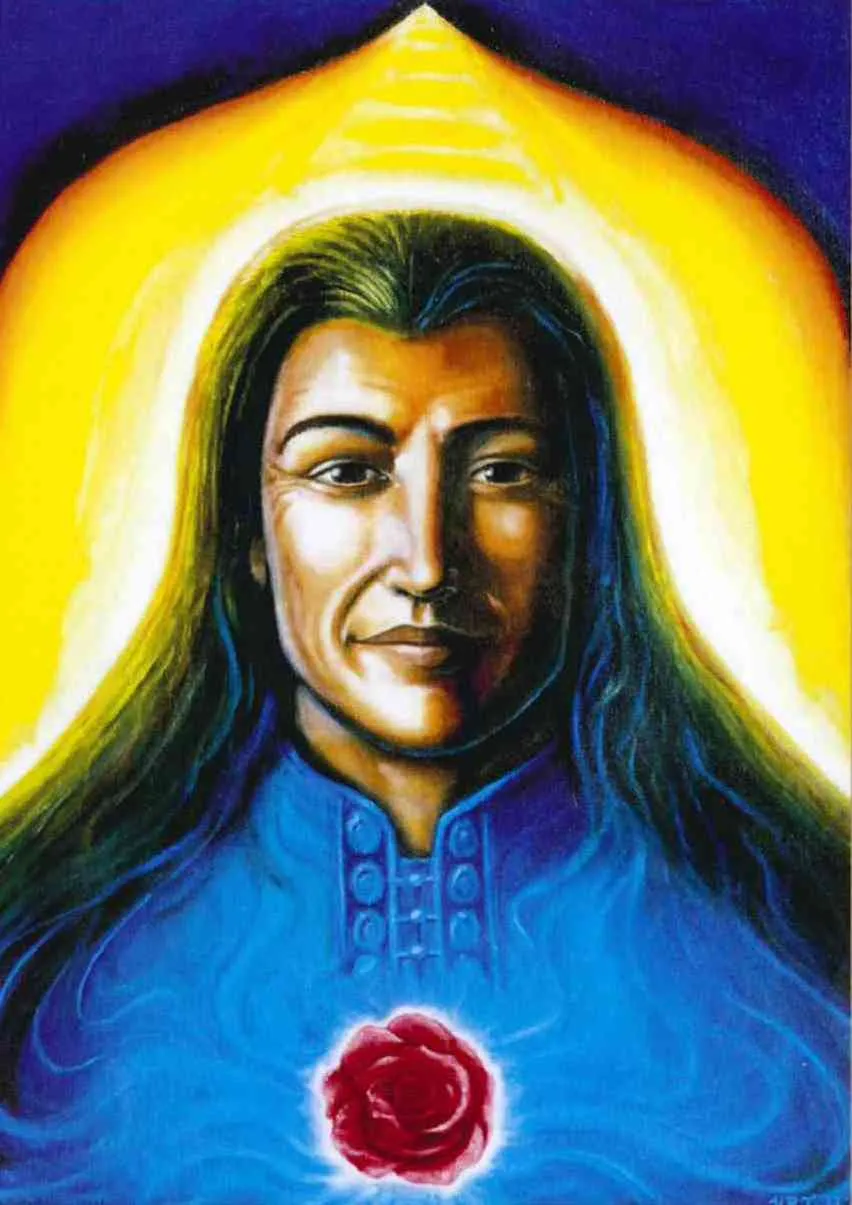Crossed Lines: Ascended Masters and the Kiwis who channel them
Bronwyn Rideout - 19th February 2024
Yasmeen Clark and Raman Pascha, Part 1
For an island nation with a population of 5.3 million, I would hazard that we have more than our fair share of pākehā with a hotline to millenia-long dead Asians. And by more I sadly mean a non-zero number. While they won’t use the word, they are modern day mediums, a paranormal practice/belief that has failed to provide any empirical evidence for its efficacy.
In the final edition of Crossed Lines, I look at the soon-to-be formerly Christchurch-based Yasmeen Clark, and her long-term relationship with the non-corporeal Raman Pascha.
The scriptural adage of “If you build it, they will come” is the best way to describe the business acumen of Yasmeen Clark and her partners, both literal (husband Jonathan Spark) and invisible (Raman Pascha). Whether it’s owning an award-winning restaurant or two (former owners of Hello Sunday as of 2020 and former shareholders of 5th Street as of 2021), an overseas personal touring business, or running a popular summer festival (NZ Spirit South Island with Frank Heke), Clark and Spark are the poster children for boomer hustle culture. Mainstream New Zealanders might look at this portfolio and just see a couple of wealthy new-agers, but it doesn’t take much digging to discover that it is actually their home-spun spirituality which dominates their work and fills the coffers.
There is little information out there about Yasmeen’s pre-Raman life. According to a 2019 Stuff article by Vicki Anderson, Yasmeen was born sometime in 1960, and lived in Mosgiel as a toddler. Clark claimed that, from an early age, she was able to see spirits. Between the ages of 12 and 16, Clark traveled around NZ on a boat with her family, and attended school via correspondence. Electoral roll records place Clark in Invercargill in 1978, working as a shop assistant as Gaylene Marie Clark. While living in Australia in 1981, Clark reports having had a series of very vivid dreams where she would be talked at by a man who would tell her everything about her life and her future. And then she promptly forgot about it.

Yasmeen (Far Left), Jonathan Spark, and others at the 2018 Christchurch Hospitality Awards
Returning to Anderson’s article, Clark was 26 years old in 1986 when she was first contacted by Raman Pascha. Pascha, aka the Master Khamouri, lived over 2 millennia ago, and was born in northern Persia to Persian/Afghani parents. His father was an emissary to the royal court, and Pascha would work as his father’s courier before being invited into Cyrus the Great’s Court of Council. Through astrology, Raman became aware that there was a special child waiting for him in Babylon and when the child, named Yasmeen Rasier, was six, she went to live with Raman and begin her teaching.


Raman Pascha, left, as depicted by a former client of Yasmeen Clark, and Tabaash, right, for comparison purposes.
At the time Clark was a housewife listed on electoral rolls as Gaylene Bridgeman, and teaching meditation to a group of six other women. It would be during the third gathering of this group that Clark claims the first channeling session with Raman occurred. Clark describes the experience thusly:
“We began the meditation and I felt a lot of energy in myself, and for the first time, rather than monitoring how everyone else was doing, I became very absorbed in my own process. I went through a period of feeling that I was being sucked up off the chair by a vacuum and I had a lot of adrenalin, and heart palpitations, and gripped the chair to hold on. I really wasn’t sure what was happening but I didn’t like it very much. At the end of the meditation I didn’t say anything to anyone, but one of the women asked me if I was all right because I had sounded as though I were breathing strangely. I looked at her and explained what had happened and that I was okay but the experience hadn’t felt good. I continued to talk with everyone about their meditation and asked them what they had felt.
Halfway through discussing my friend’s husband’s experience of his meditation I felt myself drift away in mid-sentence and lost consciousness. About half an hour later when I opened my eyes and shook myself awake, I began talking to him again, finishing off what I’d been saying before. He looked at me and smiled and everyone else laughed. I asked why they were laughing as what I was saying was not particularly funny. They told me a man had been sitting there talking to them for half an hour. When I heard that, suddenly everything slotted into place and I couldn’t deny what had happened. I had a lot of energy in my body. I couldn’t sit still in the chair and I felt as if I wanted to go and do something physical, such as play a game of squash and run around the block.
As well as having a lot of energy I felt rather euphoric, but very disturbed at the same time. I asked them what had happened and they said that the man had told them about themselves and that what they were looking for was inside them; that they were to continue to look within for what they needed. I found it absolutely amazing. I was really stunned. I didn’t expect it to happen and I didn’t even really like the idea that it had happened to me. It sounded very New Age and I didn’t see myself as that way inclined at all.”
As per Clark’s telling, word soon spread and people were interested in seeing this for themselves. Clark is vague about what was happening in her personal life, but there was apparently some emotional upheaval courtesy of her husband at the time. Raman provided emotional support through this, and occasionally appeared in some observable form. Raman also informed Clark that when he was alive, she had been a young girl under his care and herself had become an advisor to Cyrus the great.
The choice of Cyrus is, I suppose, appropriate for the time and locality when Raman was allegedly alive. But I often wonder what inspires people to choose certain personas for this type of work. Clark’s contemporary Blair Styra had started his spiritual journey around the same time, albeit with the spiritual church in 1984, before landing on the persona of a 5,000 year old Tabaash. Given their ages, I wonder if the political events in Iran, and the Shah’s use of Cyrus the Great as a symbol of Iran, possibly made an impression on Clark and Styra during childhood in the way Ancient Egypt or Dinosaurs do today. Alternatively, maybe a visiting channeler or some other new age fad winding its way through New Zealand in the mid-to-late 1980s inspired these two. While Bruce Lyon is three years older than Styra and Clark, the source of his channeling is very much a part of the Bailey-driven esoteric movement that he followed from the mid-to-late 1990s, which has a strong leader in New Zealand based astrologer Lawson Bracewell.
Like Styra, Clark doesn’t call Raman Pascha an ascended master, but rather “The Master Khamouri” and “enlightened spiritual master”. What Master Khamouri refers to is unclear. Raman has the trappings of an ascended master, but Clark does not give any indication that she is aware of the wider spiritual hierarchy or that Raman “communicates” with DK, Koot Hoomi, Comte St. Germain, or Master Jesus. But where DK is interested in the spiritual evolution of humanity, Raman is about personal growth and self-empowerment. So it might be safe to presume that, rather than being directly influenced by Alice Bailey and the University of the Seven Ray et al, Clark falls within one of the numerous new age spin-off groups that lean on Bailey’s neo-theosophical concepts with no awareness as to their origins. Maybe this is best evidenced by her explanation of constant references to Roses in relation to Raman:
“Why the rose, you ask? (And if you didn’t, you definitely should) Because “Raman has long held the Rose as sacred and teaches from the cycles of the Rose,” Yasmeen explains. Every species of plant has a resonant frequency, and the rose has one of the highest. Meditating in close proximity can tune the meditator into the higher frequency, resulting in “higher realms and thought patterns.” Just in case you needed MORE reasons to rollick through the rose bushes. We love learning more about our own humanity by hanging with Raman in his garden full of these sacred blooms.”
On the surface, Raman’s published works oscillate between toxic positivity and bog-standard new age aphorisms. For example, from Law of Acceptance:
“The nature of life means that at any given time something or someone is likely to come along and challenge what you find acceptable. It will be stimulated to expand, to grow, to see even greater possibilities than you knew before that. Therefore it is vital you are open, relaxed, not holding on too tight to your ideas that you know so far. Because my friends, what you know so far can be expanded on into infinity and if things are unfinished, uncompleted, then do understand, what is acceptable now will be unacceptable later on. It may seem to be a limitation to you. It may seem to become quite a constriction when compared to what you might desire in the future. So everything you know and hold dear, believe is acceptable to you now, is likely to change.”
and
“So it is vital to realise that what really allows the acceptance is the allowance of an experience. It is the allowance of the feeling, the allowance of the moment. Until you allow the energy and the feeling to be there, acceptance is going to be very difficult to reach. There is likely to be quite a restriction around what is occurring and therefore you are likely to impose conditions and limitations in order to keep things safe, controllable and within your reach, within your choice in fact. When you allow something to be felt in that moment, there is no fight, there is no resistance, there is only calm. There is only openness. Now acceptance ultimately means openness. Acceptance is the most wonderful feeling because it is not an external thing. Even if it is external - occurrences and people that are really challenging something new for you, acceptance is something only you can do. It is a place only you can turn towards and fall into within yourself. It is not about agreeing and falling in with others’ plans and ideas. It is not about falling and giving way. It is not about falling with others. It is about knowing that it is something vital and important for you to allow to occur or to allow yourself to experience”
So far, so mundane, and maybe even something Skeptics can feel like they get behind if they want to try to change hearts and minds. But within high-cost/high-demand organisations, i.e. ISTA, we know this sort of bland encouragement to open one’s mind can make people vulnerable to exploitation, as it can tease its audience away from healthy boundaries as it does from unhealthy beliefs. Framing your guru’s messages in terms of love all the time can become a form of love bombing on its own; unscrupulous leaders can manipulate followers under the pretense that their guidance or directives are done out of love and not self-service.
With Clark and Pasha, high-cost can take on a very literal meaning. You can accelerate your personal growth when you attend one of the many courses, workshops, kirtans, or retreats that are under the Pascha name. In the early 2010s, local evening events could cost from $15 to $35 or more, during which Clark would channel Raman and, similar to Styra’s act in the 1990s, Raman would answer questions. As per the 2020 version of the Pascha website, counselling with Yasmeen alone costs $150, $175 with Raman there too, and $250 for 1 hour with just Raman.
Pascha is currently advertising a webinar series to be held in March 2024 for an early-bird price of $1,256. Anderson’s 2019 article notes Raman’s Rose Path Service which, for a bargain of $1,175 / year, subscribers would get a birthday blessing, podcasts, and a personal essence every two months. In its current iteration, Raman’s Rose Garden, which is something of a Raman fan club, offers supporters the privilege of receiving personalised blessings or answers from Raman at a cost of $30-$60, depending on urgency. There is also a webstore, but aside from the $10 MP3s, most items are out of stock.
You can watch Yasmeen channel Raman in multiple Youtube videos. She has described the experience elsewhere as being akin to walking over a cliff backwards; she steps out of her body and her consciousness and goes off into another dimension. For lack of a better description, it is a white woman putting on a very bad and generic Middle Eastern accent:
What will likely be most bothersome for skeptics is that Clark, Spark, and Pasha have been very active in the therapy and counseling space for a long time now.
As per the electoral records, Clark has been referring to herself as a counselor since 1995, and as Yasmeen since the 1998 electoral roll, although the use of Yasmeen may have been as early as 1997 as per the companies register listing for Spirit of Living. As per Papers Past, there is no archived reporting of these activities, and it is more that certain that Clark’s original meditation sessions were by word of mouth. Jonathan Spark was on the scene by 1994, but what his qualifications are is… unclear. As per his consultancy website, he states that he has been a Pascha Therapist for 29 years and is the VP of, you guessed it, the NZ Association of Intuitive and Pascha Therapists. He also has a level 5 Teacher Certificate from the NZQA.
Spark isn’t registered with the NZ Association of Counsellors (and neither is Clark), but that isn’t entirely surprising. Counsellors, as a profession, are unregulated under the Health Practitioners Competence Assurance Act of 2003, although there are smaller associations that individuals can apply to join. However, as we will see, in the absence of regulation fringe therapies/groups can create their own associations that provide them with a layer of legitimacy in a legal and corporate sense, without having all of the structure necessary to properly protect the public. This also extends into the education sector, as the NZQA has a history of accrediting institutions such as Wellpark and similar schools, although that’s not to state that Spark received his certificate from such schools. The government in general just has a very poor history of effective intervention where pseudoscience, and the very real harm it can cause, are involved.
Exactly when Clark and Spark contemplated starting a formalised therapy business alongside their spiritual offerings is murky, although the official website suggests that 1995 was the year in which Intuitive Therapies was formed with an eye to nurturing a client base. In 2004, Clark started offering the Pascha Therapist Training course, and in 2006/2007 their business became Pascha Therapies Limited. Clark continued to provide face-to-face-ish sessions with Raman, while also commencing a training programme with a limited number of students. The general thrust of Pascha, as a therapy, is using one’s deep understanding of one’s own feelings, and developing it into a source of active intuition that can be used to intuit what is happening in the lives of others. During the four-year course students would learn business skills (as well as start promoting themselves as a Pascha therapist trainee on their business cards and brochures), and build relationships with spiritual guides in order to become spiritual human guides. The info page for the course is vague, and pretty much presents the programme as four years of a gradual deepening of one’s understanding of the human soul. At one point, trainees were given the opportunity to work in the free clinic, which offered 3 free appointments to people who couldn’t afford it.
You know, unpaid labour by people who weren’t fully trained in a modality that isn’t evidence-based.
To coincide with the education programme, Clark and Spark formed a professional body. Initially called the New Zealand Association of Intuitive Therapists, the New Zealand Association of Intuitive and Pascha Therapists (NZAIPT) (see some examples of diplomas here) is just another way for students to continue giving money to the Pascha organisation after graduation. Further, students are required to make a commitment to regular supervision of a minimum of once a month. If Yasmeen serves as supervisor, graduates will dole out $140/month for the privilege, but other graduates promote their services as supervisors as well.
However, when you check out the number of practising Pascha therapists, it’s pretty dire. There are 9 listed therapists, 7 if you exclude Clark and Spark. Which is a wild prospect when you consider that as of 2019 they claimed they’ve trained at least 400 therapists. That’s an appalling turnover, but maybe indicative of the actual profitability/appeal of Pascha Therapy outside of Yasmeen and Jonathan’s orbit. Most of the therapists listed have other day jobs, or Pascha is just another accreditation to go alongside their conventional qualifications and day jobs as regulated healthcare professionals as psychotherapists, etc. It is possible though that this particular page isn’t thoroughly updated, as Pascha therapists show up in the weirdest places, and despite being unlisted, still proudly list themselves as Pasha therapists.
Unlike other groups (looking at you ISTA/Highden), the NZAIPT has a complaints process and a code of ethics. Mind you, the latter is poorly edited and how effective the code or the complaints process are is unknown. Just as there is no transparency about the cost of training or NZAIPT membership, there is no transparency about whether Pascha Therapists have been expelled from the NZAIPT or had their membership discontinued. If the numbers of active practitioners is truly so low, could an ethics board large enough be effectively convened to adjudicate complaints fairly? It is very clearly written that Therapists are not to engage in sexual or romantic activities with clients, sexually harass anyone, or offer their services to people they’ve had sexual or romantic relationships with. Which is smart and good, and miles ahead of other groups.

When you consider that Pascha Therapy is, itself, built on the historically unethical ground that is channeling, then the NZAIPT’s code is seen as little more than a farce.
That’s it for this week. Come back in a fortnight for part 2, as we continue to look at Pascha Therapy and the big changes that have happened business-wise for Spark and Clark.